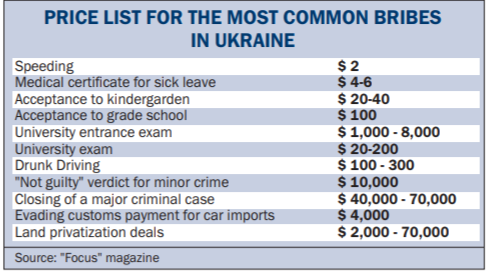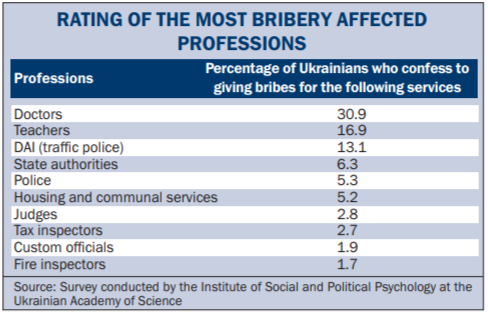Demanding and making informal cash payments has become an integral part of Ukraine’s post-Soviet culture
According to a recent poll, every second Ukrainian has given a bribe this year. Bribery is down three percent compared to 2006, but experts say that demanding and making informal cash payments has become an integral part of Ukraine’s post-Soviet culture. Analysts said low wages and light penalties bolster the phenomenon.
The survey of 2,000 adult respondents was conducted earlier this month by the Kyiv-based Institute of Social and Political Psychology (ISPP).
ISPP found that in 2006 slightly over 50 percent of respondents admitted to giving bribes, while 47 percent have admitted to doing so this year.
Institute deputy director Lyubov Naydyonova said that 2007 bribery admissions were most frequent in the country’s western and central regions (including Kyiv), where 54 and 53.5 percent of respondents admitted to offering a bribe. The study found this figure stood at 40 percent in the east and 37.5 percent in the south of the country.
Nearly a third of respondents admitted to paying off medical workers (down five percent year-on-year), followed by teachers and professors (down 17 percent) and traffic police (down 13 percent).
Naydyonova noted that the bribery of doctors and teachers is gradually falling as higher wages introduce financial stability. She said that bribing tax police is down because of stricter controls within the state tax administration. She said that bribing traffic police is up by more than half a percent year-on-year.
Bribery up in Kyiv
The head of the Kyiv city police department on combating bribery Oleh Kotlyar said that the capital’s police have handed 90 bribery cases to the courts this year, while the total number of cases in 2006 was 85.
Last year, police cracked down on bribery dealings worth Hr 1.3 million (just over $200,000), while this year the number has already grown to Hr 1.9 million ($315,000).

So far this year, seven cases have involved sums greater than $50,000; bribes ranged from $10,000-$25,000 in ten of the cases. Fifteen cases involve government officials, while another 15 involve educators and four bribery cases have been uncovered in medical establishments.
About Hr 11 million ($2.1 million) worth of bribes dealings were uncovered nationwide in 2007, according to deputy minister of internal affairs Mykhailo Kornienko.
In a recent statement Kornienko said that police managed to uncover only one in every eight incidents of bribery. He said that between 60 and 70 percent of all bribery activity falls within the business sector where the sums paid out are growing with each passing year.
A doctored medical report can cost between $20 and $60, university entrance can be secured by paying between $1,000 and $4,000 (depending on the school) and land permits run up to $10,000.
Light penalties
Andrey Osipov, the president of the Kyiv-based Corruption Counteraction Committee (CCC), said that bribery is not falling and many people will never admit to making under-the-table payments. For the past three years his organization has provided legal services to plaintiffs in corruption-related court cases. He said that requests for legal assistance for corruption-related court cases have recently grown.

“Ukrainian laws are unclear and slippery, people can hardly protect their rights legally, so they look for workarounds and often the only way to solve the problem is to give a bribe. Moreover the penalties for bribery are rather light in Ukraine – in most cases a fine. It is easier to pay a bribe to someone you know has taken one before,” Osipov said mockingly.
According to the Criminal Code, the fine for receiving bribes ranges from between 750 and 1,500 untaxed monthly minimum wages. With minimum wages at Hr 440, the amounts range from Hr 330,000 ($65,350) to Hr 660,000 ($130,700). The fines for offering bribes are somewhat lower at 200 to 500 hundred minimum monthly salaries. Prison sentences for receiving and giving bribes range from two to five years.
Deep-rooted tradition
Naydyonova said that the “bribery tradition” is deeply-rooted in local mentality and is encouraged by financial instability.
Naydyonova said the number of offered bribes will fall as wages rise, but cautioned that that the tradition of giving extra presents is deeply-rooted. Her institute’s poll found that 40 percent of respondents considered bribe-giving as acceptable, as long as the sums are not exorbitant. Thirteen percent said that bribery is in keeping with good tradition, while slightly more (13.5 percent) said that bribery is unacceptable.
“Bribes have been an element of the country’s culture already for many years. Its origins are in the eastern culture, as even in ancient times there was a tradition to give additional ‘presents’ for certain services.”
“This was reinforced in Ukraine because people understand that certain essential professions (doctors, teachers) are insufficiently rewarded,” she explained.
Osipov says that the culture of bribery began to take root after the revolution of 1917, when the entire state’s structure was ruined.
“Before 1917 the state structure was quite strong and we were third in the world according the economical development. The Soviet system failed to create a strong economy and adequate laws, resulting in permanent financial, economical and political instability and insecurity. Thus emerged the custom to solve problems with the help of bribes, in other words our mentality,” said the CCC president.
